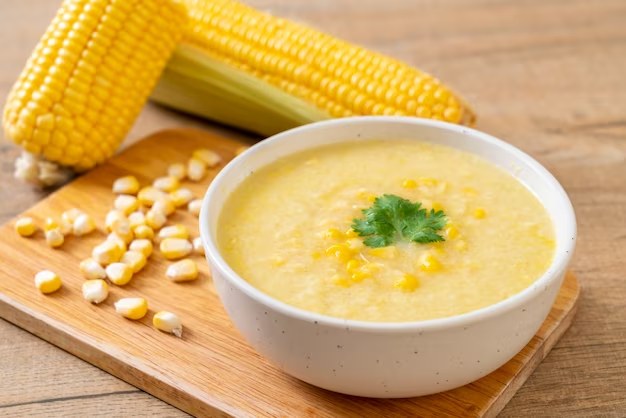Samp is an interesting breakfast you can prepare with coarsely ground skinless maize kernels. It’s a popular dish in Africa, with different cooking and serving varieties. While parts of South Africa and its surrounding countries call this recipe samp, other African countries have differing names for it.
In Ghana, for instance, this recipe is of two types, named after the methods used to prepare them. These names are oblayo and ekwegbe.
Become an insider. Subscribe to our newsletter for more top trending stories like this!
In this guide, we want to focus on how you can prepare samp Eswatini way.
Although you can prep the maize yourself, save time by buying ready-made raw samp in the market or on Amazon.
If you choose to prep the corn yourself, use this fantastic Chef’n Cob Corn Stripper to remove the dry corn from its cob.
Are you ready?
People Also Read: Recipe: Savor the Exquisite Blend of Flavors in Benin Dahomey Fish Stew
How to Prepare Samp in 11 Simple Steps
Ingredients
- 1 ½ cup of samp
- 2 liters of Water
- 1 tbsp of butter
- 1 tbsp of salt
Instructions
- Wash and transfer the samp into a big bowl.
- Pour enough water to submerge the samp. Leave it to soak overnight. This process makes the dry corn soft, reducing the cooking time.
- Drain and add fresh water, about a liter or more, to the samp in a big pot.
- Put to a boil on medium heat.
- Cover the pot, but slide the lid halfway when it begins to boil. This step will prevent water from draining from the cooking pot into the stove.
- Leave it to boil for 60 to 85 minutes on low heat.
- Open the pot and stir occasionally, adding extra water if the cooking water drains.
- Once the samp is soft, add a tablespoon of butter and stir slowly to mix thoroughly.
- Add salt to taste.
- Simmer for 5 to 10 minutes
- Serve hot alongside a vegetable dish or beef stew.
Samp Serving and Cooking Tips
- You can choose to boil the samp directly without soaking it overnight. However, this will take 3 or more hours.
- There are some varieties that add beans to the samp before cooking. You can try that variety, too, if you desire.
- Add cream and simmer for a few minutes before turning the heat off.
- In some parts of Africa, you can add peanut butter instead of cream.
- For a crunchy dish, add roasted peanuts to your dish.
- In South Africa, you can add curry leaves while you cook. Note that curry leaves are different from bay leaves.
Video Credit: Cook with Terry
Become an insider. Subscribe to our newsletter for more top trending stories like this!
This YouTube channel shares recipes from across the world.
People Also Read: Recipe: A Guide to Preparing Kanda Ti Nyma

Eswatini’s Samp
Equipment
Ingredients
- 1 ½ cup of samp
- 2 liters of Water
- 1 tbsp of butter
- 1 tbsp of salt
Instructions
- Wash and transfer the samp into a big bowl.
- Pour enough water to submerge the samp. Leave it to soak overnight. This process makes the dry corn soft, reducing the cooking time.
- Drain and add fresh water, about a liter or more, to the samp in a big pot.
- Put to a boil on medium heat.
- Cover the pot, but slide the lid halfway when it begins to boil. This step will prevent water from draining from the cooking pot into the stove.
- Leave it to boil for 60 to 85 minutes on low heat.
- Open the pot and stir occasionally, adding extra water if the cooking water drains.
- Once the samp is soft, add a tablespoon of butter and stir slowly to mix thoroughly.
- Add salt to taste.
- Simmer for 5 to 10 minutes
- Serve hot alongside a vegetable dish or beef stew.
Video
Nutrition

Nearly 80% of consumers visit directories with reviews to find a local business. List your business for free in our exclusive Spotcovery Black-Owned Business Directory.
Spotcovery offers unique and fresh daily content on Black culture, lifestyle, and experiences. We talk about everything black, black people, black-owned and black-owned businesses. We also deliver authentic and relevant content that will inform, inspire, and empower you! The future of black media is critical to today’s black experience! Our primary audience includes African Americans, Africans, Afro-Caribbeans, and people of African heritage. Black culture is for the culture!
Become an insider. Subscribe to our newsletter for more top trending stories like this!




